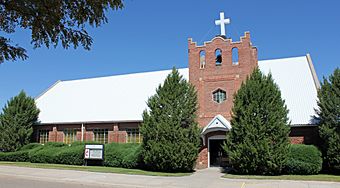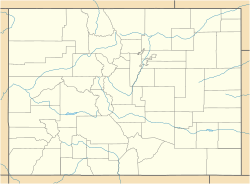Eads Community Church facts for kids
Quick facts for kids |
|
|
Eads Community Church
|
|

The church in 2013.
|
|
| Location | 110 E. 11th St., Eads, Colorado |
|---|---|
| Architectural style | Jacobean Revival |
| NRHP reference No. | 13000606 |
| Added to NRHP | August 20, 2013 |
The Eads Community Church is a very old and important church building located in Eads, Colorado. It is special because of its unique building style, called Jacobean Revival architecture. People also think it is important because it is the oldest, biggest, and best-kept church building in Kiowa County, Colorado. This church was added to the National Register of Historic Places in 2013. This means it is recognized as a significant historical place.
The Church's Story
Starting the Church Building
Back in 1920, Eads was one of only a few towns in Kiowa County that had a church. The people of Eads decided they needed a bigger church building. They also wanted it to be a community center. This center could host fun events like sports.
An architect named William White Stickney from Pueblo, Colorado drew up plans for the new building in 1920. The church was expected to cost about $35,000. However, it was hard for the town to collect enough money during construction. Residents had promised money, help, and materials. But only about 24% of the promised $30,754 was actually collected.
Because of this, community leaders decided to finish only the church basement. This basement section extended up to the first floor. Then, difficult times came, like the Dust Bowl and the Great Depression. These were periods of severe dust storms and economic hardship. Plans to finish the rest of the building were put on hold for many years.
Finishing the Church
In 1949, a local resident named William T. Holland came up with new plans. These plans were cheaper ways to complete the church. In January 1951, the building project started again. Another architect from Pueblo, John James Wallace, Jr., was asked to design the rest of the church.
The very first church services in the fully completed building were held on October 28, 1951. The new parts of the building allowed for 220 people to sit comfortably. In 1969, the church joined with the United Methodist Church. This church group still uses the building for worship today.
See Also
 | Delilah Pierce |
 | Gordon Parks |
 | Augusta Savage |
 | Charles Ethan Porter |



